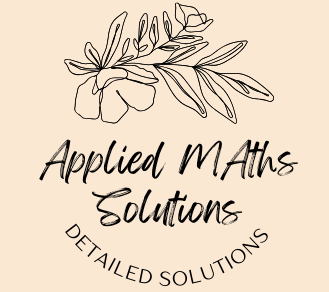
Class 11 ML Aggarwal Book.
INTRODUCTION
Applied Maths is a branch of mathematics that deals with mathematical methods and techniques that are applied to solve real-world problems in various fields. Mathematics is useful not only to engineering stream students, but it has wide use in higher studies in the fields of economics, commerce, social science, and even in liberal arts. Unlike pure mathematics, which focuses on abstract concepts and theories, applied mathematics aims to use mathematical tools to understand and solve practical problems that arise in other disciplines.
Mathematics is a beautiful and interesting branch of study and has widespread use in many areas of life. However, many students have an unnecessary fear of mathematics. Our efforts are to provide a logical sequence to develop and strengthen the concepts.
HOW APPLIED MATHS IS HELPFUL FOR COMMERCE STUDENTS:
Applied Maths can be incredibly helpful for commerce students in several ways:
- Finance Analysis and Modeling: Commerce students often deal with financial data, such as budgets, investments, and financial statements. Applied mathematics provides tools for analyzing this data, developing models to predict future trends, and making informed decisions about investments, pricing strategies, risk management, and more.
- Optimization: Applied mathematics offers techniques for optimizing various aspects of business operations, such as production schedules, inventory management, resource allocation, and supply chain logistics. Commerce students can use optimization methods to maximize profits, minimize costs, and improve overall efficiency.
- Statistics and Data Analysis: Understanding statistical methods is essential for interpreting data and making informed decisions in commerce. Applied mathematics provides a framework for statistical analysis, hypothesis testing, regression analysis, and other techniques that are valuable for analyzing market trends, consumer behavior, and business performance.
- Risk Management: Commerce students need to understand and manage risks associated with financial investments, business operations, and market fluctuations. Applied Maths provides tools for quantifying and managing risks, such as probabilistic models, Monte Carlo simulations, and option pricing models.
- Decision Support System: Applied Maths plays a crucial role in developing decision support systems and business intelligence tools that help businesses make data-driven decisions. Commerce students can learn how to use mathematical models and algorithms to analyze complex data sets, identify patterns, and generate insights that support strategic planning and decision-making.
THE MAIN DIFFERENCES BETWEEN APPLIED MATHEMATICS AND CORE MATHEMATICS LIES IN THEIR FOCUS, SCOPE, AND APPLICATION:
- FOCUS:
- Core Mathematics: Core mathematics, also known as pure mathematics, focuses on studying abstract concepts and theoretical principles within mathematics itself. It deals with fundamental mathematical structures, such as algebra, calculus, geometry, number theory, and logic, without necessarily considering their direct applications to real-world problems.
- Applied Mathematics: Applied mathematics, on the other hand, emphasizes the use of mathematical techniques and methods to solve practical problems in various fields, including science, engineering, economics, computer science, and more. It involves the application of mathematical concepts to analyze real-world phenomena, develop models, make predictions, and solve specific problems.
- SCOPE:
- Core Mathematics: Core mathematics explores the underlying principles and theories of mathematics, often delving into abstract concepts and proving theorems. Topics may include mathematical structures, formal systems, abstract algebra, real analysis, complex analysis, and more.
- Applied Mathematics: Applied Maths encompasses a wide range of topics and techniques, including mathematical modeling, numerical methods, optimization, statistics, probability, differential equations, and more. These tools are used to address practical problems across various domains, such as physics, engineering, finance, biology, and social sciences.
- APPLICATION:
- Core Mathematics: While core mathematics may have applications in other fields, its primary focus is on developing mathematical theory and understanding mathematical structures for their own sake, rather than for immediate practical applications.
- Applied Mathematics: Applied Maths is directly concerned with solving real-world problems by employing mathematical methods and models. It seeks to provide solutions, insights, and predictions that can be applied in specific domains to address practical challenges and improve decision-making.
Here we provide the solutions for CBSE Applied Maths problems for class 11 and 12 which is of specifics textbook “ML Aggarwal”. Applied Maths covers topics such as, calculus, differential equations, linear algebra, probability, statistics, and mathematical modeling, among others.
Here’s a general overview of some common topics covered in applied mathematics classes at the high school level:
- CALCULUS: Solutions involve differentiation, integration, limits, optimization, and applications of derivatives and integrals. Example problems might include finding derivatives or integrals of functions, solving optimization problems, and analyzing motion or growth using calculus.
- DIFFERENTIAL EQUATIONS: Solutions involve solving ordinary differential equations (ODEs) and understanding concepts such as first-order, second-order, linear, and nonlinear differential equations. Example problems might include solving initial value problems, modeling exponential growth or decay, or analyzing systems of differential equations.
- LINEAR ALGEBRA: Solutions involve understanding matrices, vectors, systems of linear equations, matrix operations, determinants, eigenvalues, and eigenvectors. Example problems might include solving systems of linear equations, finding inverses of matrices, or diagonalizing matrices.
- PROBABILITY ANS STATISTICS: Solutions involve understanding probability distributions, statistical measures, hypothesis testing, regression analysis, and probability calculations. Example problems might include finding probabilities, calculating expected values, conducting hypothesis tests, or fitting a regression model to data.
- MATHEMATICAL MODELLING: Solutions involve using mathematical tools to model real-world phenomena and solve practical problems. Example problems might include modeling population growth, analyzing rates of change in physical systems, optimizing production processes, or predicting financial trends.
Applied Maths Class 11 Chapters :
| Chapter – 1 | Numbers |
| Chapter – 2 | Indices and logarithms |
| Chapter – 3 | Quantitative Aptitude |
| Chapter – 4 | Mensuration |
| Chapter – 5 | Sets and Relations |
| Chapter – 6 | Sequences and Series |
| Chapter – 7 | Permutations and Combination |
| Chapter – 8 | Logical Reasoning |
| Chapter – 9 | Functions |
| Chapter – 10 | Limits and Continuity |
| Chapter – 11 | Differentiation |
| Chapter – 12 | Probability |
| Chapter – 13 | Descriptive Statistics |
| Chapter – 14 | Compound Interest and Annuity |
| Chapter – 15 | Taxation |
| Chapter – 16 | Utility Bills |
| Chapter – 17 | Straight Line |
| Chapter – 18 | Circle and Parabola |
Applied Maths Class 12 Chapters :
| Chapter – 1 | Numbers, Quantifications and Numerical Applications |
| Chapter – 2 | Numerical Inequalities |
| Chapter – 3 | Matrices |
| Chapter – 4 | Determinants |
| Chapter – 5 | Differentiation |
| Chapter – 6 | Applications of Derivatives |
| Chapter – 7 | Integrals |
| Chapter – 8 | Differential Equations |
| Chapter – 9 | Probability |
| Chapter – 10 | Inferential Statistics |
| Chapter – 11 | Time – based Data |
| Chapter – 12 | Perpetuity, Sinking Funds and EMI |
| Chapter – 13 | Returns, Growth and Depreciation |
| Chapter – 14 | Linear programming |


Please share solutions for applied mathematics for classxi, and class xii
sure…we are working on it.
If you need any specific chapter you can tell us.
I want solutions of chapter 17 straight line..
Sure…will uploaded soon
stay connected !!
Hiii want answer
We have uploaded some of the chapter of class 11 you can go through it.
we working on for the further chapters of both class 11 and class 12.
Ml Aggarwal applied math’s
yes
Needed probability and logarithm solution
Nice
Thank You!!
*It is very helpful
Means Alot..!!
Needed probability and logarithm solution
Working on it….will be uploaded soon
where r the solutions?
you can search with chapter name….you will get the solution
I will even put links that will help you as well
where are the solutions?
You can search with chapter name…you will get the solutions.
You can search by writing @appliedmathsolution.com
I need straight line all solutions
Sure… Will be uploaded soon
Please upload chapter 2 and 4 fast
Chapter 4 is already uploaded
Here is the link : https://appliedmathsolution.com/wp-admin/post.php?post=119&action=edit
chapter 2 will be uploaded soon
Provide me solution of chapter 2 of class 111 applied math
Provide me ch 17 solutions class 11
Sure…Soon !!
It’s also not yet uploaded
Chapter 7 . Permutations and combinations not there in solutions.
Dear, its not uploaded yet.
But i asure you will be uploaded as soon as possible.
It been more than a month….. Still not yet uploaded ….
I want the solutions of differentiation
Please try to post it in 2 to 5 days
I will try mt best
Keep in touch…!!
Hey ch 6 plz
Sure…Soon
Please post solution of chapter 16
Please can you send class 11 chapter 12 solutions also?
Sure, I will try to upload it asap.
pleaseeeeeeeeeeeeeeeee
provide me chapter10 solution
Sure, I will try to upload it asap.
Please upload chapter 10 limits and continuity
Sure, I will try to upload it asap.
can u provide ch 4 pls
Can I please get the chapter 10 solutions
Article writing is also a excitement, if you know then you can write if not it is complex to
write.
Right here is the perfect web site for anyone who wants
to find out about this topic. You understand so much
its almost tough to argue with you (not that I actually will need
to…HaHa). You certainly put a brand new spin on a subject that has been written about for ages.
Great stuff, just excellent!
What’s up, I wish for to subscribe for this blog to get latest updates,
therefore where can i do it please help out.
Very nice blog post. I absolutely love this site. Keep writing!
This is my first time visit at here and i am in fact impressed to read everthing at alone place.
I am actually grateful to the owner of this site who
has shared this great article at at this place.
An outstanding share! I have just forwarded this
onto a colleague who was conducting a little homework on this.
And he in fact ordered me lunch due to the fact that I found it
for him… lol. So let me reword this…. Thank YOU for the meal!!
But yeah, thanks for spending time to talk about this topic here on your blog.
Hi! I could have sworn I’ve been to your blog before but after browsing through many of the articles I realized it’s new to me.
Anyways, I’m definitely happy I stumbled upon it and I’ll be bookmarking it
and checking back regularly!
chpter 16 pleace
Which Class?